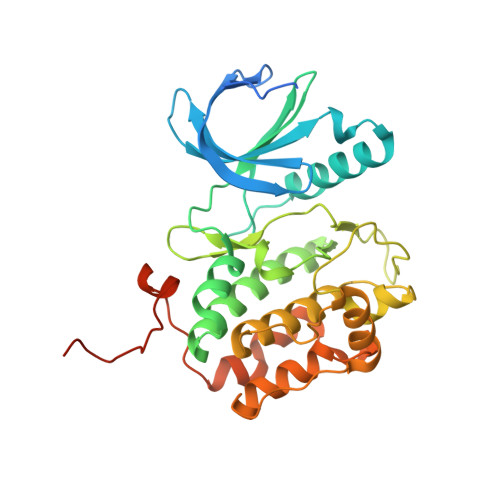Structure of the catalytic domain of human polo-like kinase 1.
Kothe, M., Kohls, D., Low, S., Coli, R., Cheng, A.C., Jacques, S.L., Johnson, T.L., Lewis, C., Loh, C., Nonomiya, J., Sheils, A.L., Verdries, K.A., Wynn, T.A., Kuhn, C., Ding, Y.H.(2007) Biochemistry 46: 5960-5971
- PubMed: 17461553
- DOI: https://doi.org/10.1021/bi602474j
- Primary Citation of Related Structures:
2OU7, 2OWB - PubMed Abstract:
Polo-like kinase 1 (Plk1) is an attractive target for the development of anticancer agents due to its importance in regulating cell-cycle progression. Overexpression of Plk1 has been detected in a variety of cancers, and expression levels often correlate with poor prognosis. Despite high interest in Plk1-targeted therapeutics, there is currently no structure publicly available to guide structure-based drug design of specific inhibitors. We determined the crystal structures of the T210V mutant of the kinase domain of human Plk1 complexed with the nonhydrolyzable ATP analogue adenylylimidodiphosphate (AMPPNP) or the pyrrolo-pyrazole inhibitor PHA-680626 at 2.4 and 2.1 A resolution, respectively. Plk1 adopts the typical kinase domain fold and crystallized in a conformation resembling the active state of other kinases. Comparison of the kinetic parameters determined for the (unphosphorylated) wild-type enzyme, as well as the T210V and T210D mutants, shows that the mutations primarily affect the kcat of the reaction, with little change in the apparent Km for the protein or nucleotide substrates (kcat = 0.0094, 0.0376, and 0.0049 s-1 and Km(ATP) = 3.2, 4.0, and 3.0 microM for WT, T210D, and T210V, respectively). The structure highlights features of the active site that can be exploited to obtain Plk1-specific inhibitors with selectivity over other kinases and Plk isoforms. These include the presence of a phenylalanine at the bottom of the ATP pocket, combined with a cysteine (as opposed to the more commonly found leucine) in the roof of the binding site, a pocket created by Leu132 in the hinge region, and a cluster of positively charged residues in the solvent-exposed area outside of the adenine pocket adjacent to the hinge region.
Organizational Affiliation:
Pfizer Global Research and Development, Research Technology Center, 620 Memorial Drive, Cambridge, Massachusetts 02139, USA.

















